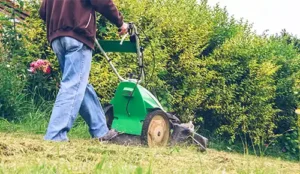Are you looking to create a landscape that is not only visually appealing but also environmentally responsible? Sustainable landscaping practices might be the key. When planning landscaping for commercial properties – including office buildings, shopping centres, or industrial parks – it’s essential to focus on more than just aesthetics. By focusing on sustainable methods, you can reduce your environmental impact, enhance the functionality of your space and boost your property’s value.
Curious to learn more about how these practices can benefit you? Keep reading to discover the essentials of sustainable landscaping for commercial properties.
What is sustainable landscaping?
Sustainable landscaping is the use of eco-friendly techniques and materials to design, create, and maintain outdoor spaces that minimise environmental impact. As sustainability becomes increasingly important in commercial property landscaping, these practices offer significant benefits for the environment. Sustainable landscaping not only focuses on aesthetics, but also on reducing water and energy use, limiting chemical applications, and promoting ecological balance. This approach leads to healthier, more resilient landscapes that support broader environmental goals and contributes to people’s well-being.
Sustainable landscaping benefits
Environmentally friendly landscape design and incorporating sustainable gardening practices is not only visually appealing, but also provides some amazing benefits. These include:
- Improving soil health by reducing erosion
- Reducing flooding and impact on public drainage systems
- Allowing native plants to thrive, reducing fertiliser and pesticide needs which helps to offset potentially higher up front costs.
- Providing safe and healthy environments for wildlife habitats and encouraging pollinators
Environmental benefits
Commercial properties often have a significant environmental impact, with landscaping contributing to this footprint. Sustainable landscaping is all about minimising the impact on the environment, cutting down on water and energy use, using fewer chemicals and planting native species. This helps commercial properties to create green spaces that support biodiversity and preserve natural habitats and resources.
Financial benefits
Implementing sustainable landscaping practices can lead to considerable cost savings for commercial property owners by reducing the use of water and energy expenses. These sustainable gardening practices not only cut utility costs but also enhance a property’s visual appeal. Additionally, properties that embrace sustainable landscaping often see an increase in market value and appeal.
How can you incorporate sustainable gardening practices into your landscape design?
There are several things you can do to promote sustainable practices within landscape design. Here’s a few ideas:
- Use recycled materials like concrete to minimise unnecessary waste of natural resources
- Maintain existing trees and plant new ones
- Try to reduce wasteful water irrigation by selecting plants carefully and preserving water through rainwater harvesting
- Prevent soil erosion by choosing natural solutions, such as rain gardens, to care for the soil
- Grow and protect native plants by reducing the amount of fertilisers, pesticides and other uses of chemicals for grounds maintenance
- Implement permeable hardscapes to allow water to soak into the soil instead of rolling off surfaces. This includes pea gravel, river rock, decomposed granite or recycled concrete to name a few
Methods of sustainable gardening practices
Understanding the methods of sustainable landscaping practices helps to develop a landscape that is both eco friendly and functional. These methods include:
Recycling and composting
Recycling in the context of sustainable landscaping includes keeping any grass cuttings and using them to decay above the lawn to provide it with nutrients. This is known as “grasscycling” and is a great method for saving time and resources such as water or fertiliser as there are enough clippings to keep your landscape healthy.
Water conservation methods
When it comes to landscaping, gallons of water can be used. Yet there are methods that use less water and produce the same effects and benefits. Here are a list of ways to conserve water when landscaping:
- Smart irrigation system: These systems are especially effective for commercial, large properties as you can schedule time to water the landscape, with the option of adjusting the amount of water used.
- Xeriscaping:This method involves transforming your landscape by applying soil, rocks and mulch to decrease the area of land that needs watering, eliminating the need for irrigation of the landscape.
- Mulching: Mulching includes using natural elements and plant debris such as sticks, dead leaves and branches to decay on top of the landscape. This increases the ability of the soil to absorb and hold water, reducing the chance of erosion and conserving water.
Use fertilisers and pest control products carefully
It is important to use the right products (and the right proportions) to eliminate the chances of destroying your landscape. Over-applying fertilisers and pesticides that contain strong chemicals can have a negative effect on plants growing in your grounds and the insects and animals that visit it, so make sure you read labels and understand the usage instructions before treating your grounds with these..
So, why should you consider sustainable landscaping practices?
Sustainable landscaping is an important approach to modern commercial properties. By adopting these sustainable gardening practices, your visually appealing outdoor spaces can become environmentally friendly and energy efficient too.
At Dependable Limited, we offer a wide range of property services, whether that be residential or commercial property. If you’re looking for ways to improve the sustainability of your grounds, our team of commercial landscaping contractors can help! Get in touch to find out how we can help today.




